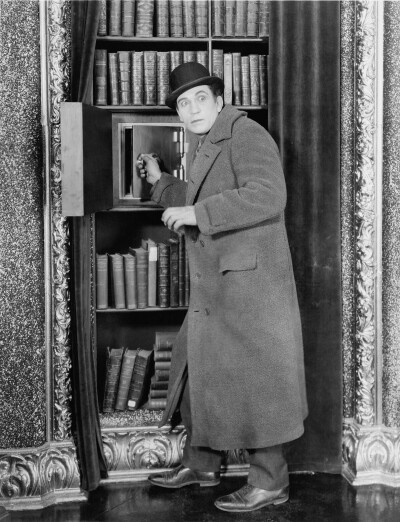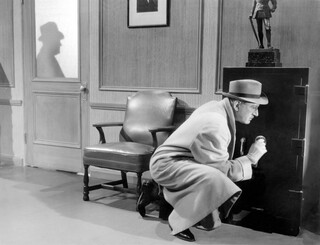Like any other industry, the criminal business of stealing what should be safe has its legends. If there are legendary criminals on whose stories movie scripts are based and whose names are known to every child, then there can be no lack of Poles among them. Today, we will take a look at the figure of the king of bank robbers of the Second Republic of Poland, whose intelligence may have impressed, and whose life of crime inspired the creation of the ethos of the gentleman burglar on whom Polish burglars modelled themselves over the following decades. There may have been better cashiers in his time, but more famous ones certainly were not.
The career of a safecracker
Stanislaw Antoni Cichocki, alias 'Vandyke' (Szpicbródka in Polish), is a highly mysterious figure. The place and exact date of his birth are unknown, although he was probably born around 1890.
He began his criminal career in Tsarist Russia as an alumnus of the so-called Odessa school of cashiers. Our king of safebreakers acquired most of his skills from Wincenty Brocki, who became famous in the criminal world for breaking into the Jasna Góra monastery (1909), from where he stole valuables, jewels and precious devotional items. In the process, he committed sacrilege, which shocked Poles in all three partitions. Cichocki himself started early, already as a seventeen-year-old he took part in the notorious bank robbery in Berlin at the time.
However, Vandyke's main area of work in the early part of his career was Russia, where the later king of bank robbers became famous for his spectacular undermining of the Asiatic Bank in Rostov. Eventually, at the investigative office in St. Petersburg, they reached the thread to the puck and Cichocki fell in. He exchanged his sentence of exile to Siberia for cooperation with the police there and for the next few years carried out orders for the Russian secret police.
Later, Cichocki emerges as the likely author of several burglaries in Germany, Czechoslovakia, Lithuania and other Central European countries.
King of Polish burglars
Stanislaw Cichocki appeared in Poland around 1920, which, for obvious reasons, aroused the interest of domestic law enforcement agencies. In view of this, he led a quiet life for some time. He was an industry consultant, which on the one hand allowed him to reap a substantial profit, while on the other hand he did not involve his own person in burglaries. Here he bought himself a tenement house, built a villa in Świder (surroundings of Warsaw), and became co-owner of the "Black Cat" cabaret and one of the bars on Marszałkowska Street in the capital city. He led an exemplary family life. He had a three-room flat decently furnished, but not luxurious. He sent his children to schools and brought them up carefully. And yet he did not give up his "trade". He prepared many successful burglaries, including the Landau Bank, Bank Dyskontowy (Discount Bank) and the State Graphic Works. And so on.
Eventually, the police came across his trail when he was preparing to rob a branch of the Bank Polski (Polish Bank) in Częstochowa. The robbery failed to materialise and Vandyke was taken into custody. After bribing the guards, Szpicbródka ran away and a short time later took part in a robbery of the Bank Spółdzielczy (Co-operative Bank) in Pabianice. He was caught in 1932, and this time he was taken to court, where the case of the foiled robbery in Częstochowa came up again. He was convicted and served 6 years.
The pattern repeated itself several times, e.g. in 1937, he robbed the Spółdzielczy Bank Kredytowy (Cooperative Credit Bank) in Warsaw, was caught again and served 4 years.
The outbreak of the Second World War found him in prison in Sieradz. The last thing we know about him is that he reached Africa with the Army of General Anders, where he was sent to Uganda from a distribution point. What happened next is unknown. Maybe he became a local cacique, or maybe he broke into the tombs of the pharaohs.
He looks like a complete nobody
Apart from anything else, Stanisław Antoni Cichocki, alias Vandyke, is a very interesting character. Gentleman burglars were not uncommon in those days, but it is his story that inspires most. Cichocki was a man with absolutely impeccable manners befitting the manner of the archetypal king of bank robbers.
He was extremely engaging, spoke beautifully in several languages, always immaculately dressed with an elegantly trimmed beard to which he owed his nickname. He led a lavish life, in a word: a beautiful man among his beautiful friends.
According to people who knew him personally, he was perfectly suited to be a good ambassador who could be entrusted with some good post with a clear conscience. In fact, however, Stanisław Cichocki fits like a glove into the role of the protagonist of his own crime novel.

Vandyke in culture
Stanislaw Cichocki and his story are inspiring. Although he was undoubtedly a dangerous criminal, the king of Polish burglars, his story, his manner, and even his trial, in which he powered the dock, make Szpicbródka a graceful hero.
No wonder, then, that a film was made about him. "Hallo Szpicbródka czyli ostatni występ króla kasiarzy" ("Hallo Szpicbródka or the last performance of the king of the safebreakers") from 1978, directed by Mieczysław Jahoda and Janusz Rzeszewski, is quite a pleasant musical for which the script was written by Ludwik Starski. The story told in the film departs sharply from what we know for sure about Cichocki, but his archetype of the gentleman, the seducer who, under the guise of a philanthropist and benefactor, prepares to rob a credit bank, is maintained.
The film stands out for its subtle storytelling, great music and the best possible cast at the time. Vandyke is played by the excellent, as always, Piotr Fronczewski, who is accompanied by the beautiful femme fatale Gabriela Kownacka and Ewa Wisniewska, and Jan Kobuszewski basically needs no introduction.
"Hallo Szpicbródka..." is not the only film in which we can find references to Cichocki. The much more popular film 'Vabank' by Juliusz Machulski, in which the retired bank robber is played by the director's father, Jan Machulski, uses the theme of a blade disarming the alarm system in Krammer's bank. In exactly the same way, Cichocki planned to neutralise the alarm before the robbery of a credit bank in Częstochowa.
We write about the safes in the cinema in another article.
Chamber of secrets
Vandyke is not the greatest burglar in the history of Poland (that title, of course, goes to the one about whom we know nothing, not even whether he existed at all), but he is an interesting character, shrouded in mystery. We do not know Cichocki's fate after the end of the Second World War, and this raises many questions. Perhaps he got off at the nearest station somewhere in Africa, became a farmer and made his days in peace and quiet, or perhaps he returned to his profession and was behind some of the most spectacular burglaries in all of Europe, except this time he didn't get caught?
We don't know and we won't find out, but this is perhaps the most beautiful thing about our steel and concrete industry, that it has such flavours, this touch of romantic mystery, it has its heroes and 'villains' that we can listen about.





